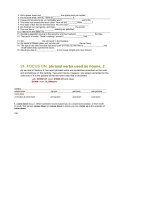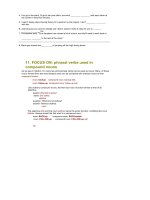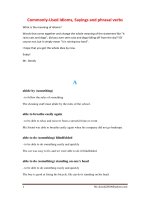phrasal verbs used as nouns 3
Bạn đang xem bản rút gọn của tài liệu. Xem và tải ngay bản đầy đủ của tài liệu tại đây (105.05 KB, 16 trang )
11. I really depend on my laptop computer when I travel on business. I don't know how I ever
_______ _________it.
12. George and Linda ________ ________ for three years before they got married.
13. Several people were killed when the bomb ________ ________.
14. Bob and Marsha aren't________ ________spending more than $250,000 for their
new house.
15. My divorce settlement cost me a lot of money. It almost _______ me _______.
16. The FBI started with a list of six suspects, but they _______ it ________ to two.
37. FOCUS ON: phrasal verbs used as nouns, 3
When phrasal verbs are used as nouns, the verb is usually in the infinitive form;
however, a small number use a different form of the verb.
For example, left over and grow up use the past participle:
We ate leftovers the day after Thanksgiving.
The grown-ups sat at one table, and the children sat at another.
talk to and go over use the -ing form:
Mr. Young gave his son a good talking-to.
Before I buy this car, I'm going to give it a good going-over.
and grown-up uses the past participle:
Only grown-ups are allowed to drive.
Infinitive
present tense -ing form past tense past participle
brush off
brush off & brushes off brushing off brushed off brushed off
1. brush ...off p.v. When you brush people off, you ignore them or refuse to listen to them
because you are not interested in or do not like what they are saying.
My boss just brushes me off when I try to tell her how to increase our profits.
The reporters tried to ask him some questions, but he brushed them off.
brush-off n. When you give people the brush-off, you ignore them or refuse to listen to
them because you are not interested in or do not like what they are saying.
The boss just gave me the brush-off when I tried to give him some advice. 2. brush ... off p.v.
When you brush off a critical remark or problem, you ignore it
and continue as before without letting it affect you.
I told Dr. Smith that he had made a mistake, but he brushed it off.
My father's cholesterol is very high, but he just brushes it off.
Infinitive
present tense -ing form past tense past participle
come on
come on & comes on coming on came on come on
1. come on p.v. When an electrical device or machine comes on, it begins to
operate, usually automatically. Go off is the opposite of come on.
It was so cold that the heat came on last night.
When you open the refrigerator door, the light comes on automatically.
2. come on p.v. When a television or radio program comes on, it begins.
Do you know when the news will come on?
The late movie comes on at 1:00
A
.
M
.
3. come on p.v. When you want to encourage people to do something or when you want
them to do something quickly, you say "Come on!"
Believe me, you're going to love this garlic ice cream. Come on, try it!
Come on! I can't wait all day.
4. come on p.v. [informal] When you think that people have done or said something
improper or unreasonable, you say "Come on."
Tom didn't study for one minute, and you're telling me he got 100 on the test? Oh, come on.
Hey, come on! I told you not to do that again.
5. come on p.v. [always continuous] When you begin to feel a headache or an illness
developing, you feel the headache or illness coming on.
I might be sick tomorrow; I feel something coming on.
I feel a headache coming on. Do you have any aspirin?
6. come on p.v. When you come on a certain way, you speak or deal with people in that
way.
Paul needs to learn to be more of a gentleman. He comes on too strong, and women don't like that.
Bob comes on kind of arrogant, but he's actually a nice guy.
7. come on (to) p.v. [informal] When you come on to people, you approach them and try
to interest them in romance or sex.
Toad came on to Judy at the party, and she told him to get lost.
I can't stand that guy Ned. He's always coming on to me.
come-on n. [informal] A provocative comment or action intended to interest a person in romance or
sex is a come-on.
281
Todd uses the same come-on with all the girls, and it never works.
come-on n. A discount or special offer designed to get people to buy something is a
come-on.
The bank is offering a free VCR as a come-on if you open an account with them.
Infinitive
present tense -ing form past tense past partic
cover up
cover up & covers up covering up covered up covered u
1. cover... up p.v. When you cover something completely, you cover it up.
I covered the cake up so no bugs would land on it.
Cover this stuff up — I don't want anyone to see it.
covered up part.adj. After something has been completely covered, it is covered up. Is
the meat covered up? I don't want flies to land on it.
2. cover... up p.v. When you cover up a crime, you do something to try to prevent other
people from learning of it.
There's no point in trying to cover up the crime. Too many people already know about it.
The mayor was accused of covering up his ties to organized crime.
cover-up n. Something you do in order to prevent a crime from becoming known is a
cover-up.
The mayor denied being part of a cover-up and claimed he was innocent.
hang out
hang out & hangs out hanging out hung out hung out
1. hang out p.v. [informal] When you hang out at a place, you spend time there
without any important purpose. Hang around is similar to hang out.
Doesn't Nancy have a job? It seems as if she hangs out at the beach every day.
I don't have anyplace to go. Do you mind if I hang out here for a while?
hangout n. [informal] A hangout is a place where you spend time without any
important purpose.
The police closed the bar, saying it was a hangout for crooks and gang members.
leave over left over
1. leave over p.v. [always passive] When something is left over, it remains after
people have used or taken as much of it as they need or want.
I guess I made too much food; look how much is left over.
I paid all my bills and had only $ 17 left over.
282
leftover part.adj. Something that is left over remains after people have used or taken
as much of it as they need or want.
You can have this leftover pasta for lunch tomorrow.
leftovers n. [always plural] Food items that remain uneaten after people have finished
eating are leftovers.
Leftovers again? When are we going to have something different for dinner?
Infinitive
present tense -ing form past tense past participle
Let down
let down & lets down letting down let down let down
1. let ...down p.v. When you promise people you will do something and then fail to do it,
you let them down.
My son promised to stop using drugs, but he let me down.
I really need you to help me move tomorrow. Please don't let me down.
let down part.adj. When people promise you they will do something and then fail to do it,
you feel let down. When you are disappointed because you cannot have something you
want to have, because you cannot do something you want to do, or because something is
less exciting than you expected it to be, you feel let down.
You broke your promise to me that you would quit smoking. I feel very let down.
letdown n. When you say that something is a letdown, you are disappointed because you
cannot have or cannot do something you want to or because something is less exciting
than you expected it to be.
I had tickets for the fifth game of the World Series, but my team lost in four games. What a letdown.
After the way everyone talked about how great the movie was, I thought it was something of a letdown.
payoff
pay off & pays off paying off paid off paid off
1. pay... off p.v. When you pay off money that you owe or pay off the person you owe the
money to, you pay all the money that you owe.
I wasn't happy with the people we hired to paint our house. I paid them off and told them not to return.
It took ten years, but I finally paid off my school loan.
paid off part.adj. After you pay all the money that you owe to someone or to a lending
institution, the debt or loan is paid off.
I made my last payment yesterday, and now my car loan is paid off.
2. pay... off p.v. When you pay people money so that they will do something illegal or
allow you to do something illegal, you pay them off.
283
The politician tried to cover up the crime by paying off the witnesses.
Don't expect the police in this city to do anything about gambling — they're being paid off.
payoff n. A payoff is money paid to someone to do something illegal or to allow you to do
something illegal.
The chief of police was videotaped accepting a payoff.
3. pay off p.v. When something you do pays off, it is successful and is worth the effort
you made.
Medical school is a lot of hard work, but it'll pay off someday.
The restaurant changed its menu, and it really paid off. Business increased by 30 percent.
payoff n. A benefit you gain because of an effort you make is a payoff.
Linda doesn't get paid for the volunteer work she does.
The payoff is knowing that she has helped other people.
Infinitive
present tense -ing form past tense past participle
talk to
talk to & talks to talking to talked to talked to
1. talk to p.v. When you talk to people, you have a conversation with them.
Are you talking to me?
I don't like Bob. He talks to me like I'm some kind of idiot.
talking-to n. A talking-to is a serious discussion in which you scold or lecture
someone.
Dan's behavior is outrageous. Someone should give him a good talking-to.
EXERCISE 37a — Complete the sentences with phrasal verbs from this section. Be
sure the phrasal verbs are in the correct tense.
1. I forgot to _______ the chicken _______ after we finished dinner, and the cat ate it.
2. A patient died after Dr. Smith gave her the wrong medicine, and the hospital tried to
________it________.
3. I don't care what Nancy thinks of me. If she criticizes me, I'll just ________ her ________.
4. I worked for nine years to get my Ph.D., and now I can't find a job in my field. All that work sure didn't
________ ________.
284
5.1 set the thermostat so that the air conditioner ________ ________ if it gets over eighty degrees. 6,
You can trust Erik to keep his promises. He won't ________ you ________.
7. I didn't like that car salesman we talked to last night. He ________ ________ too strong. 8. I called
Heather last night, but I didn't _____ _____ her; she was in the shower.
9. _______ ________ in bars isn't my idea of fun.
10. I tried to apologize to Jane, but she just _____ me _____ and continued walking.
11. I want to ________ my mortgage ________ early, so I'm making two payments every month.
12. Look at TV Guide to see when the show ________ ________.
13. Karen sure isn't shy. Did you see how she was ________ ________ to my brother at the party?
14. After Thanksgiving so much turkey will be________________that we'll be eating it for two weeks.
15. I hope I'm not getting sick. I feel a cold ________ ________.
16. The contractor was accused of ________ ________ city officials in exchange for contracts.
EXERCISE 37b — Complete the sentences with nouns from this section.
1, You need to finish school. The ___________ won't come for years, but it's worth it.
2,1 didn't have time to make anything for dinner, so we're having ________ tonight.
3. This place isn't as beautiful as it looked in the pictures. What a ___________.
4. Judy isn't interested in anything I say; she always gives me the ___________.
5. The senator was convicted of taking a ___________.
6. The low interest rate the credit card company offers if you switch to their card is just a
__________. After six months they increase it to 18 percent.
7. The politician was accused of being part of a ___________.
. 285









